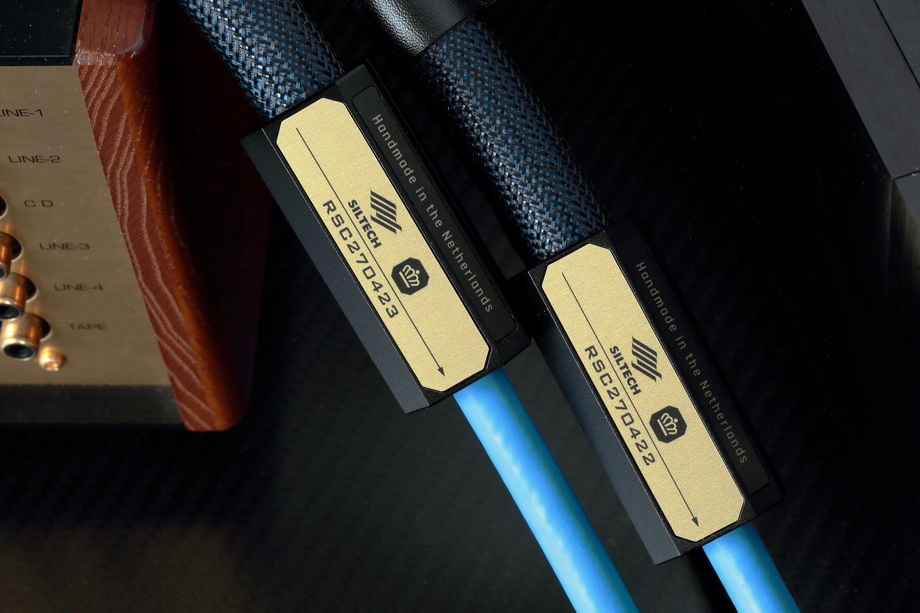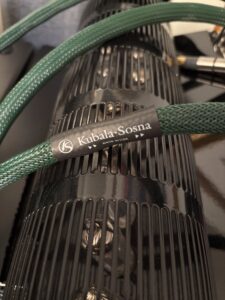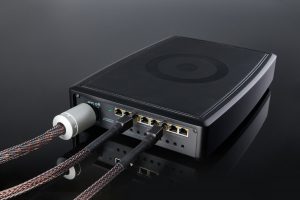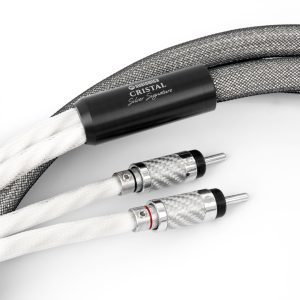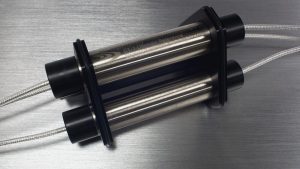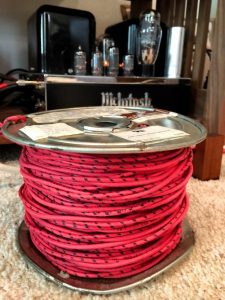Siltech is one of the three brands that make up International Audio Holding BV. Founded in 1983 in Nijmegen, the Netherlands, it specialized in silver cabling. In 1992 it was bought by Edwin van der Kley Rynveld, an electronics engineer, who introduced it to the exclusive world of high-end. We are testing an RCA analog interconnect from the Royal Crown series.
One of the most important news of end of 2023 was that sent by International Audio Holding:
International Audio Holding (IAH), home to respected audio brands Siltech and Crystal Cable, is proud to announce the acquisition of HMS Elektronik effective January 1st 2024. HMS Elektronik is a leading German manufacturer of power supply voltage filters, audio cables and accessories. This strategic move will mark an expansion of IAH's product portfolio and solidify its position as a key player in the high-end audio industry.
High Fidelity News, 22.12.2023, HERE, accessed 2.01.2024.
I'll admit that this was rather surprising news, as both Siltech and Crystal Cable have both power cables and AC power strips in their product line. Apparently, however, HMS Elektronik has something the Dutch manufacturer needs. So, if I understand correctly, the idea was on the one hand to absorb the solutions developed by the German specialist, and on the other hand to develop them on the basis of technologies developed in the Dutch Elst.
However, before we knew about this acquisition, news of Siltech's new Royal Crown series arrived back in 2022. Replacing the Royal Signature series in the catalog, it was to be part of the company's 40th anniversary celebration. For this to make sense, and the Royal Signature was a very successful series that had been in the lineup for many years—since 2008—it had to be something special. And it is.
Royal Crown
Basic information is this, Royal Crown is a Siltech series that uses the latest version of the S10 silver conductor, not only—as before—in the Triple Crown cables, but also in the Single and Double Crown series. The new conductor can now be found in all three sub-series—Royal Single Crown, Royal Double Crown and Royal Triple Crown. In addition, they use a new dielectric system in which air insulation, Kapton and Teflon are combined, and the cables have a new Hexagon six-core design. The packaging has also been redesigned.
The Royal Single Crown series includes RCA and XLR analog interconnects, phono interconnects, speaker and AC power cables, as well as digital BNC, LAN and USB cables.
S10 Mono Crystal Silver
Siltech is an engineering company. All of its developments are the result of engineering activities, that is, projects carried out under a regime of scientific research. Listening is a very important part of these activities, but occurs only after the basic assumptions have been developed while still in simulation programs.
Siltech's primary field of research is conductors. For years it has used in-house developments and self-made monocrystalline silver conductors. Each successive generation is marked with a number—in the Royal Crown series cables it has the designation S10. According to Edwin van der Kley, Siltech's chief engineer and CEO, the idea is the same every time: to reduce impurities, but mainly to make the micro-gaps between the silver crystals as small as possible. The manufacturer's website says:
Our latest S10 Mono Crystal Silver conductor is the pinnacle of cable design and manufacturing. Casting the metal as single continuous crystals eliminates transition points to achieve the lowest possible distortion. Its increased conductivity—up to 112% over ordinary silver wire—leads to a conductor with exceptionally low loss, providing lower noise and higher power.
Royal Crown Series, HERE, accessed 2.01.2024.
These conductors, as well as the plugs, are subjected to thermal treatment, and as result the metal changes its mechanical and electrical properties as if it were much older. It works similarly to the cryogenic treatment used by other companies, but Siltech has developed its own "aging" method, in which it does not freeze them, but anneals them. The manufacturer claims that this process improves cable conductivity by 10%.
CONSTRUCTION
All Siltech cables are assembled by hand at the IAH factory in Elst. One worker is responsible for particular unit, and at the end they undergo a three-step verification process. I've seen what it looks like, and it's truly high-end handiwork; more HERE.
The cables are quite thick and quite flexible. They are built using a topology that the company calls Hexagon. The idea is that six, quite thick silver wires are routed around a hollow core, each in a double dielectric. These cables are twisted in a way developed by the company and are placed further apart than in the Signature version. Edwin, the company's chief executive, says the idea was to reduce the cable's capacitance, already low after all. A tube of dielectric is applied on the outside, and a braided shield, also made of silver, is stretched on the outside.
The whole is mechanically stabilized and covered with another layer of dielectric. As we wrote, the company this time reached for the best-known products of the American company DuPont, copied by other manufacturers: Teflon and Kapton. The Royal Single Crown series models use two layers of Kapton and an ultra-thin layer of Teflon, as we read. The manufacturer also declares that an important insulating role in the Royal Crown series plays air.
PLUGS
Siltech uses plugs manufactured for it by third-party manufacturers, and in the Triple Crown series manufactured in-house. In the Royal Single Crown and Royal Double Crown series of analog and digital interconnects, we find plugs marked SST S10 Black for RCA cables and Oyaide Focus 1 for XLR. The manufacturer says it manufactures the former in-house.
Their contacts are made of monocrystalline silver and they are crimped, not soldered. Their ground is crimped on the sockets in a similar way as in WBT plugs. Let me add that the SSTs have a matte black finish and look very nice. Just be careful not to lose the nut—they have rather short threads and like to fall out.
NFC (Near Field Communication)
Information about a particular product can be read from the screen of a smartphone equipped with the NFC function - photo by Siltech.
Every Siltech cable is branded to distinguish it from fakes. Thus, on the interconnects you will find clamped leather bands with an NFC chip. These are special tags that emit a code that can only be read with Siltech's dedicated app, available for Apple iOS or Android devices. Using this app, the owner of a cable can read the information on that particular cable using a device equipped with Near Field Communication (NFC, or Near Field Communication) feature.
To complete product authentication, one needs to register the data read in conjunction with the unique code found on the certificate included with each product. After scanning the tag, simply press the "Declare ownership" icon and then enter the code containing the cable's serial number.
More: Siltech Introduces NFC Tag & App, HERE, accessed 3.01.2024.
You can read more about Siltech's factory in Marek Dyba's report entitled Z wizytą u: Crystal Cable | Siltech (High Fidelity № 188, 16 grudnia 2019, HERE; accessed: 28.09.2021); interview with Gabi van der Kley HERE.
SOUND
HOW WE LISTENED
The Siltech Royal Single Crown interconnect was tested in the High Fidelity reference system, where it was compared to the reference cables: Siltech Triple Crown.
The interconnect connected the RCA output of the Ayon Audio CD-35 HF Edition SACD player and the input of the Ayon Audio Spheris III line-level preamplifier; both devices feature Nextgen gold-plated WBT RCA jacks installed. It was an AA/BB/A comparison, with the A and B known, and the change followed each track.
Recordings used in the test selection.
Terumasa Hino Quintet/Orchestra, Terumasa Hino Concert, Takt/Nippon Columbia COCY-80505, Swing Journal Jazz Workshop 1, "CD On Demand," CD-R (1969/1997), more HERE.
Charlie Haden and Chris Anderson, None But The Lonely Heart, Naim naimcd022, CD (1997).
Patricia Barber, Companion, Premonition Records/Mobile Fidelity Sound Lab UDSACD 2023, SACD/CD (1999/2003); more HERE.
George Michael, Older, Epic. Aegean/Sony Music Labels SICP-31544-5, 2 x Blu-Spec CD2 (1996/2022) reviewed HERE.
Before Mr. Okihiko Sugano founded his own record label, Audio Lab. Record, becoming one of the most recognizable sound engineers in Japan, he was recording for the Takt (not to be confused with the Polish Takt) label. He was already using an Ampex AG-440 B tape recorder and mixing stereo sound live. Which translated into extraordinary realism and a sense of participation in something real, rather than a recreation from a "can"; more HERE.
One of his better albums from this period is Terumasa Hino Concert by Terumasa Hino Quintet/Orchestra, recorded live at a Swing Journal workshop. The version I have is special because it is a digital remaster released as part of the "CD On Demand" series, that is, recorded on CD-R from files provided by the label. This was the first CD I listened to with the tested cable, and it was with it that the Royal Crown showed its class.
Its sound is remarkably smooth, fluid, and even—this was a surprise to me—seems warm. I know that the stereotypical "silver" cables are associated with bright highs and flashy mids, but anyone who has listened to high-end products in a well-composed system knows that if it happens it is a problem of the systems, not the cables themselves. An example is, used by me for years, the Siltech Triple Crown, whose sound I would even describe as dark. But not compared to the tested interconnect.
The latter showed Terumas Hino's trio close to me, in a slightly more compact space, but with a fantastic sense of "presence". The trumpet's attack was less "attacking," and had better (!) fluidity instead. This instrument was recorded with a great presence of space, almost in counter-phase, and its dynamics are insane. The attack of sound in it is comparable to what the Three Blind Mice label did with Tsuyoshi Yamamoto's piano - uncompromising.
The interconnect in the test showed this characteristic right away, it did not round off the attack, nor did it blur it, but it also slightly brought the presentation closer and warmed it up. The sound definition was not as good as with the Triple Crown, that's normal, but compared to any other interconnect at this price it was outstanding. Instruments were described mainly by dynamic differences in playing, by "connective tissue," that is, differences in richness and timbre.
Recorded over three days, at New York's Cami Hall, the album by Charlie Haden and Chris Anderson, titled None But The Lonely Heart, sounded equally impressive and just as engaging as its predecessor. Ken Christianson, who was responsible for its sound, was even more of a purist than Mr. Sugano, and while I'm not convinced of all his choices, his albums cannot be denied one thing: authenticity; more about True Stereo technique HERE.
The Royal Single Crown interconnect showed both musicians magnificently - there is no other way to describe it. And that's because, while keeping the proportions between the two, it fused them together, showed them playing as a "team" in the sense that they were executing a common scenario. Haden's elevated double bass (The Night we Called it a Day), first struck in 0:27, had smooth, flowing edges and emphasized the deep "body" of the instrument, in which it reminded me of the older Crystal Cable series. The Siltech Triple Crown goes lower, this was audible, but even it was not so "romantic" in rendering both instruments.
While the previously tested cable brought the foreground slightly closer, Anderson's piano was now shown at almost the same distance, only with a slightly shortened reverb. Same as the double bass, however, which seemed slightly larger and more "present." Its attack was fast and incredibly clear, and yet I had the impression of being more immersed in its sound, as if the microphone had been brought closer to him - it was not louder, but had a bigger volume.
Recorded in three days in 1999 at The Green Mill by Jim Anderson, Patricia Barber's album Companion is one of the best digital recordings I know of. Made on three Alesis ADAT eight-track recorders at 20-bit resolution and 44.1kHz sampling rate, it was analog mixed to ½" analog tape with SR Dolby noise reduction. It sounds spectacular; more about ADAT technology HERE.
A cover of Black Magic Woman sounded compelling with Siltech's new cable. But also characteristically for this cable. That is, warm and with a strong, close foreground. It still wasn't "pushed" in front of the speakers, as with some tube amplifiers, but the "tangibility" of the presentation was fantastic. Also, the dynamics were rendered beautifully—because "beauty" and "magnificence" are probably the two most important words that could be used to describe this interconnect.
These are not quantifiable, therefore difficult to describe, but once heard—recognizable later in any good performance, such as this one. Barber’s sibilants were slightly smoothed out, making her appear to have been recorded with a better microphone, at least as far as "dirt" was concerned. The Triple Crown showed more clearly the character of the stage microphone she was singing into, but it was the Royal Single Crown that more pleasantly conveyed timbres, and described space in a more engaging—which doesn't mean better, but still—way, too. Let me repeat: it doesn't mean better, it doesn't mean more accurate, but it is incredibly engaging.
Playing pop music, Siltech's cable retained exactly the same qualities that made it seem so nice to me, so enjoyable with jazz recordings. George Michael's Older, recorded on the RADAR hard disk recorder, in its latest 2022 remaster, released on Blu-Spec CD2, had with the tested interconnect equally smooth, equally charming texture as before (review HERE).
It was with Fastlove that I heard that this cable's bass is deep and powerful. Its energy is concentrated in the mid-bass area, but it sounds deep and goes low. RADAR recorders were liked for their tonal similarity to analog tape recorders, which came out nicely this time as well. The Dutch interconnect played it almost warmly, but without merging the sounds into one "mass." Which is not hard to do here, as most of the information comes to us from the listening axis, from the multi-layered palimpsest Michael filled the recording with.
When listening to pop recordings, I couldn't deny myself the pleasure of playing Boy George's greatest hits. Recorded in the summer of 1982, "Do You Really Want To Hurt Me" by Culture Club was one of its biggest hits. The producer Steve Levine, who was responsible for this success, used an early version of the Linn Drum, a drum machine that revolutionized the music scene of the 1980s, to record it.
This instrument was shown by the tested interconnect in a rather warm and smooth way. But not because it was warmed up, but because the cable enhanced its richness, as it also did, incidentally, Mikey Craig's bass pulse (more HERE). It was a fantastically colorful reproduction, dynamic, low, but also smooth. It was as if the cable was trying to show everything a little better than it was recorded.
Summary
As long as I played albums recorded in the classic, almost purist way, the Dutch cable showed them in a really accurate, faithful way. It added its own character to it, but you could hear that a large amount of information was easy for him to "process" and that it was able to create from it an extremely spectacular, believable presentation that draws you in with its warmth and beauty. On the other hand, with highly compressed recordings and multi-track production, it tried to put it all together in such a way that it sounded better, more pleasant.
This is a cable with very high dynamics and excellent tonality. It has a warm character and generally shows the foreground more strongly. Energy of presentation is very high with it, but it is not the energy that catches our attention, but the timbres. As you can see, the better conductor in the new configuration went in the direction we usually associate with conductors with added gold, whether silver or gold-plated copper. But it has added precision and resolution from itself.
The Siltech Royal Single Crown is a beautiful cable that is not only much, really much better than the previous Signature version, but comes dangerously close to the earlier Double Crown version. Yes, it is that good a product.
International Audio Holding BV
https://internationalaudioholding.com
Price (in Poland): PLN 31,500/1 mEdisonweg 8
6662 NW Elst. Netherlands.
MADE IN NETHERLANDS
Provided for the test by Nautilus Distribution http://nautilus.net.pl
text by Wojciech Pacula
pictures High Fidelity | IAG




